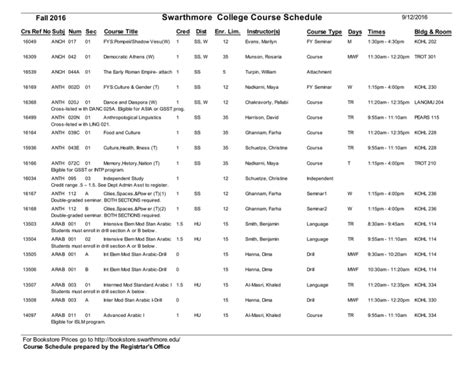Nestled in the suburban borough of Swarthmore, Pennsylvania, Swarthmore College is a highly selective liberal arts college that offers a rigorous academic program to its students. The college’s course schedule is meticulously crafted to provide students with a well-rounded education that emphasizes critical thinking, creativity, and intellectual growth.

Understanding the Swarthmore Course System
Swarthmore College follows a semester system, with each semester spanning approximately 15 weeks. The academic year is divided into two semesters: the fall semester (August to December) and the spring semester (January to May).
The course schedule is designed to provide students with flexibility and choice. Students are required to complete a certain number of courses in various distribution areas, including the humanities, social sciences, natural sciences, and quantitative reasoning. Within these areas, students can choose from a wide range of courses that align with their academic interests and career aspirations.
Course Registration Process
Course registration at Swarthmore College typically takes place during the spring semester for the following academic year. Students are advised to consult with their academic advisors to plan their course load and ensure they meet the requirements for their major and minor programs.
The course registration process is conducted online through the college’s student portal. Students can search for courses, view course descriptions, and compare course schedules to find the classes that best suit their needs. Priority registration is given to seniors and students with special circumstances, such as those with declared majors or who are pursuing honors programs.
Course Types
Swarthmore College offers a variety of course types to meet the diverse learning needs of its students:
- Lecture Courses: These courses typically involve large classroom lectures and provide students with a foundational understanding of a particular subject area.
- Discussion-Based Courses: These courses prioritize active participation and encourage students to engage in critical thinking and discussion.
- Laboratory Courses: These courses provide students with hands-on experience in scientific and experimental settings.
- Independent Study Courses: These courses allow students to pursue in-depth research or creative projects under the supervision of a faculty member.
- Experiential Learning Courses: These courses provide students with opportunities to gain practical experience in the field through internships, field studies, or community engagement projects.
Distribution Requirements and Course Selection
Swarthmore College has established distribution requirements to ensure that all students receive a broad-based education. These requirements are designed to provide students with a solid foundation in the core disciplines of the liberal arts.
The specific distribution requirements vary depending on the student’s major and program of study. However, all students are required to take a minimum number of courses in the following areas:
- Humanities: Includes courses in literature, philosophy, history, art, and music.
- Social Sciences: Includes courses in anthropology, economics, political science, psychology, and sociology.
- Natural Sciences: Includes courses in biology, chemistry, physics, and earth and environmental sciences.
- Quantitative Reasoning: Includes courses in mathematics, statistics, and computer science.
When selecting courses to fulfill these distribution requirements, students are encouraged to explore their interests and choose courses that align with their academic goals. The college’s academic advisors can provide guidance and support in the course selection process.
Common Mistakes to Avoid
To ensure a successful academic experience at Swarthmore College, students should strive to avoid common mistakes when selecting and scheduling courses:
- Overloading: Attempting to take too many courses in a single semester can lead to academic overload and decreased performance.
- Neglecting Distribution Requirements: Failing to meet the distribution requirements can result in a delay in graduation or the inability to complete a degree program.
- Not Consulting with Advisors: Seeking guidance from academic advisors can help students make informed decisions about course selection and plan their academic path effectively.
- Ignoring Course Prerequisites: Enrolling in courses without meeting the necessary prerequisites can result in academic difficulties and the need to drop the course.
- Not Prioritizing Interests: Choosing courses solely based on perceived difficulty or grade expectations can hinder intellectual growth and academic enjoyment.
Frequently Asked Questions (FAQs)
1. When is the course registration period at Swarthmore College?
Course registration typically takes place during the spring semester for the following academic year.
2. How many courses can I take in a single semester?
The maximum number of courses students can take in a semester is typically 5. However, this may vary depending on the student’s major and workload.
3. How can I find out more about specific courses?
Course descriptions and schedules are available through the college’s student portal. Students can also consult with their academic advisors for guidance.
4. Can I request permission to take courses outside of my major’s distribution requirements?
Yes, students can request permission from the department offering the course to enroll in courses outside of their major’s distribution requirements.
5. What happens if I fail to meet the distribution requirements?
Failing to meet the distribution requirements may result in a delay in graduation or the inability to complete a degree program.
6. Can I take independent study courses for credit?
Yes, students can take independent study courses for credit with the approval of a faculty supervisor.
7. How can I schedule an appointment with an academic advisor?
Students can schedule appointments with academic advisors through the college’s online scheduling system or by contacting the advising office.
8. Can I take courses at other institutions and transfer the credits to Swarthmore College?
Yes, students can petition to take courses at other institutions and transfer the credits to Swarthmore College. However, this must be approved by the college’s registrar.
Conclusion
The Swarthmore College course schedule provides students with a flexible and comprehensive framework for pursuing their academic interests and developing their intellectual capabilities. By understanding the course system, distribution requirements, and course registration process, students can effectively plan their academic path and achieve their educational goals.
